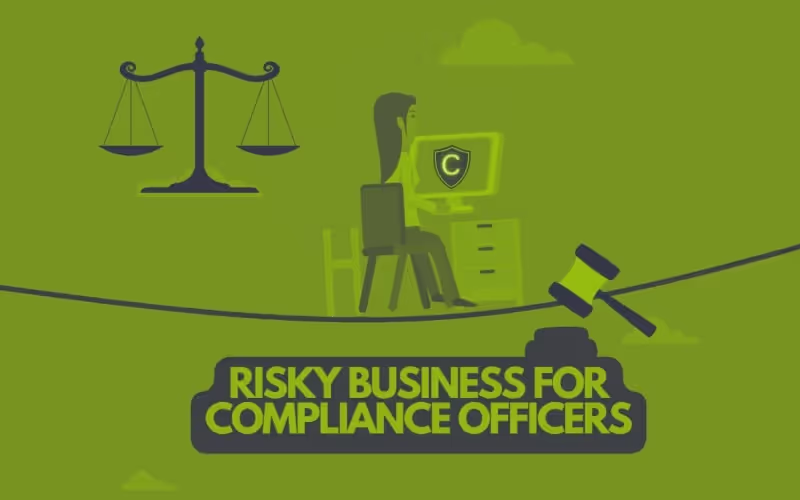
5 Ways Compliance Officers Can Minimize Personal Liability
Compliance officers are increasingly walking a tightrope. Like pilots and surgeons - if they make a mistake, even unknowingly without malice, their career, personal finances, and even their freedom could be in free fall. This article reveals five essential tips for compliance officers to minimize the risk of personal liability.
But before we dive into the tips, let's remind ourselves of the current state of play.
Challenging Times for Compliance Officers
Here is an uncomfortable reality: Ask many compliance officers about the personal risk burden they carry in their job, and feelings such as anxiety and tension are common answers. And as the WSJ reported, compliance officers working in nascent sectors such as crypto, where the rules are still evolving, feel it even more acutely. Compliance professionals operating in regulated financial sectors also are, of course, in the crosshairs.
But that's not to diminish how all compliance officers feel regardless of the industry. Because the fact is, the global trend over the last 15 years, especially since the 2007-2008 financial crisis, is a sharp rise of personal liability in compliance. And many jurisdictions have introduced personal accountability regimes - with the key objective of driving risk-aware behaviors.
In this article, we can't go through the jurisdictions individually. But we can look at some statistics to provide context. According to the Thomson Reuters global Cost of Compliance 2022 report, the following is true:
- 45% of respondents expect the personal liability of compliance professionals would increase in the coming year
- 56% of respondents said that regulatory focus on culture and conduct risk would increase the personal liability of senior managers
And as many of you reading may know, US regulators especially hold compliance officers, particularly the CCO (Chief Compliance Officer), personally responsible for violations of anti-money laundering (AML) and sanctions laws, with several high-profile cases resulting in significant fines and even prison sentences.
Interestingly, the New York City Bar Association is bucking the trend in the US, recognizing compliance officers' problems, and said, "These career-ending enforcement actions discourage individuals from becoming or remaining compliance officers."
The bottom line is this: Being a compliance officer today is tough. And doing the job carries a personal risk that is growing with each new regulation that passes.
Ways Compliance Officers Can Minimize Personal Liability

Compliance officers need all the help they can get to minimize the risk of personal liability - especially when it's too easy to get lost in the daily grind of the job, potentially missing crucial changes in regulations or best practices that could have severe consequences to their lives.
We will now cover the following essential tips to mitigate the risk of personal liability:
- Tip 1: Seek Legal Advice When Necessary
- Tip 2: Consider Insurance
- Tip 3: Keep a Personal Archive
- Tip 4: Stay Up to Date with Regulatory Changes
- Tip 5: Use Compliance Technology
Tip 1: Seek Legal Advice When Necessary
Peace of mind is a good option in unclear situations that create doubt - especially where compliance with AML laws and sanctions regimes (and the cost of non-compliance) are at stake.
Seeking legal advice is crucial for compliance officers to minimize the risk of personal liability.
And it's important to remember that local advice is essential in understanding the personal risk you undertake by performing your job in the jurisdictions in which you operate. The UK's law society says that compliance officers (with legal advice) may want an indemnity agreement, or an amendment to their employment contract, as an effective way to get better protection against any potential liability.
Tip 2: Consider Insurance
According to an insurance provider, the insurance market for compliance officers is a fast-growing field - especially for CCOs employed in publicly traded companies or financial institutions.
And think of it this way: If a self-employed plumber gets insured by purchasing insurance for unexpected events like boiler explosions (something they may be liable for), why wouldn't a compliance officer cover themselves for events they are potentially liable for?
With regulations trending toward personal liability in the compliance world, as with a self-employed plumber, the risk of personal liability also exists for compliance professionals - regardless of the fact they aren't self-employed. As with the seeking legal advice tip, compliance officers should consult local experts that understand their unique conditions.
Tip 3: Keep a Personal Archive
Compliance officers are increasingly being encouraged to keep a personal archive. And the reality is this: It could make the difference between continuing your livelihood or losing it. It's become almost standard worldwide that regulatory investigations into compliance violations cover both the company and the individual (or individuals) responsible for it.
And it creates some serious issues for compliance officers. For example, are they sure their employers won't metaphorically throw them under a bus? Unfortunately, it's a real possibility - especially when corporations receive credit for participating in investigations.
The above is one reason why personal archives are so important. But they are more complex than meets the eye. It's a problem if the compliance officer can no longer access it after they have left the company - as it may contain proprietary and non-public sensitive information.
It may be uncomfortable, but compliance professionals who negotiate access to personal archives in employment contracts and establish a process for securely storing and transferring them can help protect themselves (and potentially their employers) in regulatory investigations.
Tip 4: Stay Up to Date with Regulatory Changes
Compliance officers must stay updated with the latest laws and regulations relevant to their industry and the jurisdictions where they do business. This protects their employers, and themselves, from compliance failings that are punishable by law. The following are essential to achieve this objective:
- Monitoring regulatory bodies and government websites
- Attending online conferences and events
- Following compliance trade media (and others relevant to your industry)
- Using compliance software from third-parties
You could also follow sanctions.io on LinkedIn to get our latest sanctions & AML insights.
It takes time to stay abreast of the latest compliance and regulatory changes. Another tip is to use services like Feedly or Inoreader that allow you (and your teams) to track regulatory and compliance news.
Tip 5: Use Compliance Technology
Compliance technology is making huge strides - especially with the advent of artificial intelligence (AI). The digital transformation of businesses and organizations worldwide is also accelerating the use of regulation technology (RegTech) platforms.
And is this good news for compliance officers? Absolutely. But how so?
Compliance technology, such as sanctions.io, can bring the following benefits:
- Increased accuracy
- Improved monitoring
- Enhanced record keeping
- More comprehensive reporting
The above upsides create more robust compliance programs, which can only be good news for compliance officers concerned about personal liability.
Final Thoughts
Compliance is a thriving and attractive career choice (Find Compliance Officer jobs on Jooble). And it's important to remember that all professions have varying forms of personal risks attached to them - that's just part of life. But the fact is this: Compliance officers are facing an increasing risk of personal liability. In today's article, we examined some ways to mitigate the risks. Here are some more:
- Maintain strong relationships with regulators
- Conduct regular compliance employee training
- Establish effective monitoring and testing programs
Ultimately, compliance officers are responsible for implementing robust compliance programs that decrease risks. And, of course, it's a duty they have to themselves too.
If you would like to learn more about how sanctions.io can strengthen the compliance program within your organization, you can take advantage of our free, no-obligation discovery call with our team. Book here. We enable intelligent AI-powered sanctions, PEP, and criminal watchlist screening for your AML, KYC & trade compliance screening needs.



